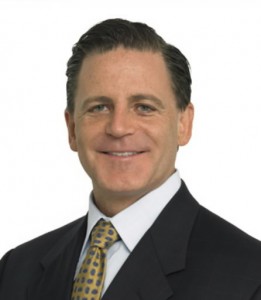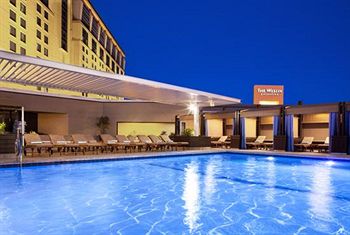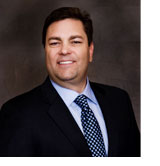 Rub a dub-dub, three companies in a tub called Rock Ohio Caesars. In emulation of Nevada‘s built-first-license-later system, the Ohio Casino Control Commission is just getting around to mulling the bonafides of Horseshoe Casino Cleveland‘s shareholders. Little-publicized minority partner Lyle Berman (left, who owns a 10% stake) got a clean bill of health from Spectrum Gaming Group. However, questions were raised about the financial outlook from debt-ridden manager/co-owner Caesars Entertainment. Company treasurer Eric Hession tried to allay concerns by saying the company’s indebtedness was down to a mere $21 billion. (Whew! What a relief.) He added that Caesars was “recovering,” which is a bit like saying you’ve got pancreatic cancer but the prognosis is favorable.
Rub a dub-dub, three companies in a tub called Rock Ohio Caesars. In emulation of Nevada‘s built-first-license-later system, the Ohio Casino Control Commission is just getting around to mulling the bonafides of Horseshoe Casino Cleveland‘s shareholders. Little-publicized minority partner Lyle Berman (left, who owns a 10% stake) got a clean bill of health from Spectrum Gaming Group. However, questions were raised about the financial outlook from debt-ridden manager/co-owner Caesars Entertainment. Company treasurer Eric Hession tried to allay concerns by saying the company’s indebtedness was down to a mere $21 billion. (Whew! What a relief.) He added that Caesars was “recovering,” which is a bit like saying you’ve got pancreatic cancer but the prognosis is favorable.
 The biggest problem, however, is majority owner Dan Gilbert, some of whose past indiscretions are dogging him. In particular, his unsecured $60K loan to felonious former Detroit mayor Kwame Kilpatrick has raised eyebrows. “Frankly, we were trying to do good for the city of Detroit and get this guy out of the way,” Gilbert testified inartfully, making it sound as though he were bribing Kilpatrick to resign. Some of Gilbert’s old, collegiate sports-betting activities are also at issue … but cripes, that was 31 years ago! Is there no statute of limitations on stupidity? And if NBA Commissioner David Stern has made peace with student-bookie Gilbert, Ohio regulators can cut him some slack, too. They ought to be looking, instead, at the accident-prone construction of Gilbert’s two Horseshoes (the other in Cincinnati). His basketball team evidently isn’t the only thing about which Gilbert is apparently ‘cavalier.’
The biggest problem, however, is majority owner Dan Gilbert, some of whose past indiscretions are dogging him. In particular, his unsecured $60K loan to felonious former Detroit mayor Kwame Kilpatrick has raised eyebrows. “Frankly, we were trying to do good for the city of Detroit and get this guy out of the way,” Gilbert testified inartfully, making it sound as though he were bribing Kilpatrick to resign. Some of Gilbert’s old, collegiate sports-betting activities are also at issue … but cripes, that was 31 years ago! Is there no statute of limitations on stupidity? And if NBA Commissioner David Stern has made peace with student-bookie Gilbert, Ohio regulators can cut him some slack, too. They ought to be looking, instead, at the accident-prone construction of Gilbert’s two Horseshoes (the other in Cincinnati). His basketball team evidently isn’t the only thing about which Gilbert is apparently ‘cavalier.’
Spectrum recommended licensing the project, despite qualms about Caesars, on the strength of Gilbert’s finances. (Things don’t look so good for Gilbert sidekick Roger Lee Dillard III, whose “truthiness” is in question.) Regulators haven’t much choice, honestly. Construction continues, slots — some 2,100 of them — have been purchased and employees hired. Even if something genuinely serious had turned up in Spectrum’s report, Horseshoe Cleveland’s momentum would carry regulators along with it, by sheer force of gravity. And if Gov. John Kasich (R) doesn’t like that fact of casino physics, maybe he shouldn’t have spitefully ashcanned all the regulators he inherited from his predecessor, forcing the oversight process to play catch-up with casino development.
 When you’re $21 billion in debt, why stop running up the corporate credit card? That’s the prevalent thinking at Caesars, which now covets a Toronto foothold. The other suitor is comparably leveraged MGM Resorts International. It’d be a smart play if all that’s up for grabs were a management contract. But there’s an extra-large fly in the ointment. In a scenario reminiscent of Kansas (which found few takers), the Ontario Lottery & Gaming Corp. would own the megaresort but outsource “funding, building or improving sites” to the private sector. Meaning Caesars or MGM would be on the hook for development and operating costs, splitting the booty with the province. It’s arrangement both companies have shied from in the past. However, the duo seem locked in a borrow/spend/borrow spiral they can neither brake nor break.
When you’re $21 billion in debt, why stop running up the corporate credit card? That’s the prevalent thinking at Caesars, which now covets a Toronto foothold. The other suitor is comparably leveraged MGM Resorts International. It’d be a smart play if all that’s up for grabs were a management contract. But there’s an extra-large fly in the ointment. In a scenario reminiscent of Kansas (which found few takers), the Ontario Lottery & Gaming Corp. would own the megaresort but outsource “funding, building or improving sites” to the private sector. Meaning Caesars or MGM would be on the hook for development and operating costs, splitting the booty with the province. It’s arrangement both companies have shied from in the past. However, the duo seem locked in a borrow/spend/borrow spiral they can neither brake nor break.
(Update: Howard Stutz of the Las Vegas Review-Journal reports that MGM is willing to spend anywhere between $2 billion and $6 billion on a Toronto foothold … almost 75% of what it blew on that failed experiment in social engineering, CityCenter. Is CEO Jim Murren printing money down in the basement?)
 For those who relish a challenge, there’s the casino-rescue project known as the Westin Casuarina, one of the last souvenirs of William J. Yung III‘s fallen casino empire, now in the hands of the casino industry’s new ownership class: creditors. Nevada regulators had an urgently pressing question on their minds. Namely, what the hell is a “casuarina“? Botany aside, I’m told it’s the name of Yung’s yacht. Bravely stepping in to try and right the WesCas ship is one Rory Lee Bedore. He’s a turnaround specialist — but his experience has been in the northern Nevada market, most recently in Carson City. That’ll be beanbag compared to slugging it out on the Strip.
For those who relish a challenge, there’s the casino-rescue project known as the Westin Casuarina, one of the last souvenirs of William J. Yung III‘s fallen casino empire, now in the hands of the casino industry’s new ownership class: creditors. Nevada regulators had an urgently pressing question on their minds. Namely, what the hell is a “casuarina“? Botany aside, I’m told it’s the name of Yung’s yacht. Bravely stepping in to try and right the WesCas ship is one Rory Lee Bedore. He’s a turnaround specialist — but his experience has been in the northern Nevada market, most recently in Carson City. That’ll be beanbag compared to slugging it out on the Strip.  He plans to save money, in part, by easing out older employees. However, instead of making botanical inquiries, the Nevada Gaming Commission would have used its time better by asking if Bedore’s “business arrangements” with WesCas’ hotel-operations side included exerting downward pressure on its heretofore ludicrous room rates. Habitual overpricing by the WesCas was largely responsible for Yung’s undoing and new ownership evidently hasn’t learned, charging $139 midweek — considerably more than comparable hotels in the same vicinity. Bedore’s casino wizardry will be for naught if that kind of price arrogance continues.
He plans to save money, in part, by easing out older employees. However, instead of making botanical inquiries, the Nevada Gaming Commission would have used its time better by asking if Bedore’s “business arrangements” with WesCas’ hotel-operations side included exerting downward pressure on its heretofore ludicrous room rates. Habitual overpricing by the WesCas was largely responsible for Yung’s undoing and new ownership evidently hasn’t learned, charging $139 midweek — considerably more than comparable hotels in the same vicinity. Bedore’s casino wizardry will be for naught if that kind of price arrogance continues.
 While Sheldon Adelson and others can’t built a casino in Macao without spending billions, Stanley Ho‘s Sociedade de Jogos de Macau is redoing Ponte 16 for a thrifty $308 million. True, it will have to split Ho’s market share with a gazillion other SJM-affiliated properties, but the prospective ROI still looks mighty attractive. By contrast, U.S. operators appear locked into a 2005-era Las Vegas mindset, deploying howitzers to kill gnats.
While Sheldon Adelson and others can’t built a casino in Macao without spending billions, Stanley Ho‘s Sociedade de Jogos de Macau is redoing Ponte 16 for a thrifty $308 million. True, it will have to split Ho’s market share with a gazillion other SJM-affiliated properties, but the prospective ROI still looks mighty attractive. By contrast, U.S. operators appear locked into a 2005-era Las Vegas mindset, deploying howitzers to kill gnats.
 Ohio isn’t the only state where regulators can’t keep up with the pace of gambling expansion. The Massachusetts Gaming Commission is under orders to become conversant with the complexities of parimutuel operations by May 20 — or else. Oh, and get on top of this casino-megaresort thing. And make it snappy, damn you. Citing Pennsylvania‘s higgelty-piggelty rush into casino gambling, commission Chairman Stephen Crosby is trying to interject some sanity into the process … and that includes not relying upon the wage-and-revenue projections of casino aspirants, who are prone to exaggeration. (Remember the “Penn National Effect,” which Ohio has come to rue?) Interestingly, an unspecified former Nevada Gaming Commission chairman might find himself seconded to the Bay State, to provide sage counsel.
Ohio isn’t the only state where regulators can’t keep up with the pace of gambling expansion. The Massachusetts Gaming Commission is under orders to become conversant with the complexities of parimutuel operations by May 20 — or else. Oh, and get on top of this casino-megaresort thing. And make it snappy, damn you. Citing Pennsylvania‘s higgelty-piggelty rush into casino gambling, commission Chairman Stephen Crosby is trying to interject some sanity into the process … and that includes not relying upon the wage-and-revenue projections of casino aspirants, who are prone to exaggeration. (Remember the “Penn National Effect,” which Ohio has come to rue?) Interestingly, an unspecified former Nevada Gaming Commission chairman might find himself seconded to the Bay State, to provide sage counsel.
 Not helping is Gov. Deval Patrick (D), who recently made the asinine contention that casinos could up and running by next spring, due diligence be damned. If he wants to be associated with slots in quonset huts, Patrick might get his wish. Admittedly, megaresort openings in 2017 are hardly what he had in mind when got behind the pro-casino push. But his last-minute scuttling of a previous legislative accord added a year to the regulation-and-development timeline, so if he doesn’t like the status quo, he needs to accept some of the blame. As we’ve seen in Ohio, Pennsylvania and Iowa, gubernatorial meddling in the casino-expansion process rarely produces anything but trouble.
Not helping is Gov. Deval Patrick (D), who recently made the asinine contention that casinos could up and running by next spring, due diligence be damned. If he wants to be associated with slots in quonset huts, Patrick might get his wish. Admittedly, megaresort openings in 2017 are hardly what he had in mind when got behind the pro-casino push. But his last-minute scuttling of a previous legislative accord added a year to the regulation-and-development timeline, so if he doesn’t like the status quo, he needs to accept some of the blame. As we’ve seen in Ohio, Pennsylvania and Iowa, gubernatorial meddling in the casino-expansion process rarely produces anything but trouble.


Caesars Windsor runs that way, as does all other Canadian casinos. They are more or less considered government services of sorts, which produces questions like “shouldn’t we close casinos on government holidays.”
It’s sort of in the same column as liquor distribution, as all but one province has government owned/operated stores that sell alcohol and you can’t buy beer at the grocery store, gas station, whatever.
Strangely enough, they could teach us a thing or two about strip clubs, which are less expensive and hustled.
If not for weeknight $0.25 roulette and the Enterprise car rental counter, the Casuarina would be nothing but a well-furnished cave…